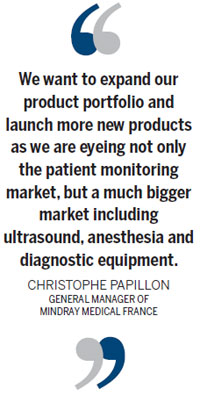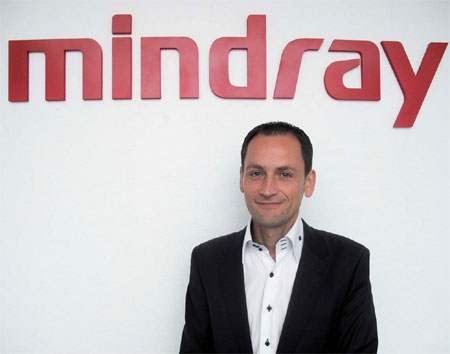Getting the best of rivals is a delicate operation
Updated: 2012-11-16 11:23
By Li Xiang (China Daily)
|
|||||||||||
|
Christophe Papillon, general manager of Mindray Medical France, says quality is the word he emphasizes most to his clients. Provided to China Daily |
Medical devices maker begins shedding its cheap image
For Christophe Papillon, leading a Chinese company to compete with some of the big names in the medical equipment industry is a demanding task, and selling Chinese products in France can be even more challenging.
Papillon, 44, general manager of Mindray Medical France, began to work for China's largest medical equipment producer and exporter Mindray Medical International Ltd in 2008 when it bought the French subsidiary of the patient monitoring business of its US rival Datascope for which he used to work.
 |
"The big difference for me after the acquisition is that my job became selling Chinese products instead of American products," says Papillon in his office in the suburbs of Paris.
He knew from the start that it would be difficult because Mindray is largely unknown in the medical equipment market in France, and the Chinese products are often seen as low-tech, low-price and of poor quality in foreign markets.
"Quality is the word I emphasize most whenever I talk with my clients," he says.
Last year a well-known private hospital in Neuilly-sur-Seine, one of the wealthiest suburbs of Paris, urgently needed to upgrade the equipment in its cardiac unit.
The hospital had once been a customer of Datascope, and Papillon saw an opportunity for Mindray. However, the first reaction of the customer was dispiriting.
"Initially the doctors didn't want to work with a Chinese company because their first reaction about Chinese product is 'poor quality'," he says. "They were really careful because it was about the lives of the patients."
To win the order, Papillon visited the hospital and hammered the company's message, including the value of its products and its willingness to develop long-term relations.
Rival companies such as General Electric and Royal Philips Electronics would not bother doing that, he says.
Eventually it was Mindray's relatively fast delivery and installation of its products that helped it nail the deal.
"It would take two months for GE to deliver," Papillon says. "But we did it in three weeks. It was our efficiency and fast response that really impressed the customer."
Although the medical equipment industry is relatively resilient to the debt crisis in Europe, the economic downturn has forced many hospitals in France to cut on spending.
"The complicated economic situation gave us an advantage as customers are forced to consider some cost-effective solutions," Papillon says. "Our big rivals are also seeing declining sales figures."
Bucking the industry's downward trend, Mindray France's sales have grown 25 percent in each of the past four years. It has successfully acquired about 10 percent market share in the business patient monitoring business, Papillon says.
To penetrate the French market, the prices of Mindray's products were initially 30 to 40 percent lower than those of GE and Philips.
But Papillon soon realized that lower prices were unsustainable and could sometimes scare off potential customers.
"We did lose some deals because our products were not expensive enough."
So Mindray France is now moving from its price advantage to brand building and innovation capability, allowing it to launch new products every three months.
"We want to expand our product portfolio and launch more new products as we are eyeing not only the patient monitoring market, but a much bigger market including ultrasound, anesthesia and diagnostic equipment," Papillon says.
Mindray France recently won a four-year order worth 14 million euros ($17.8 million) from the purchasing agency Union des Groupements d'Achats Publics, a government organization that acts on behalf of public hospitals.
It was the first time a Chinese medical equipment company won a government purchase order in France, Papillon says.
He says he is confident about achieving this year's sales target of 11 million euros.
While meeting the sales target can be a demanding job, Papillon says he never finds working with his Chinese colleagues to be difficult.
They often endearingly call him Mr Butterfly, based on the meaning of his surname.
"It is easier to communicate with Chinese people," he says. "They listen very well to what you try to express, and they want to adapt their products to the local market."
But that does not mean Papillon and his Chinese colleagues always see eye to eye.
Three months ago Mindray decided to recruit a service manager, and the top brass reckoned an experienced manager from one of the big-brand names such as GE or Philips was needed.
However, Papillon reckoned someone from a small company could do the job, so long as he or she had an open mind.
"We are at the stage of rapid expansion and our business model is new and different. So we need someone who is flexible enough to handle any problem that may occur during our operation.
"We haven't reached an agreement yet, but the good thing is communication and discussion is always possible."
lixiang@chinadaily.com.cn
(China Daily 11/16/2012 page18)
Today's Top News
Rescuers race against time for quake victims
Telecom workers restore links
Coal mine blast kills 18 in Jilin
Intl scholarship puts China on the map
More bird flu patients discharged
Gold loses sheen, but still a safe bet
US 'turns blind eye to human rights'
Telecom workers restore links
Hot Topics
Lunar probe , China growth forecasts, Emission rules get tougher, China seen through 'colored lens', International board,
Editor's Picks

|

|

|

|

|

|






